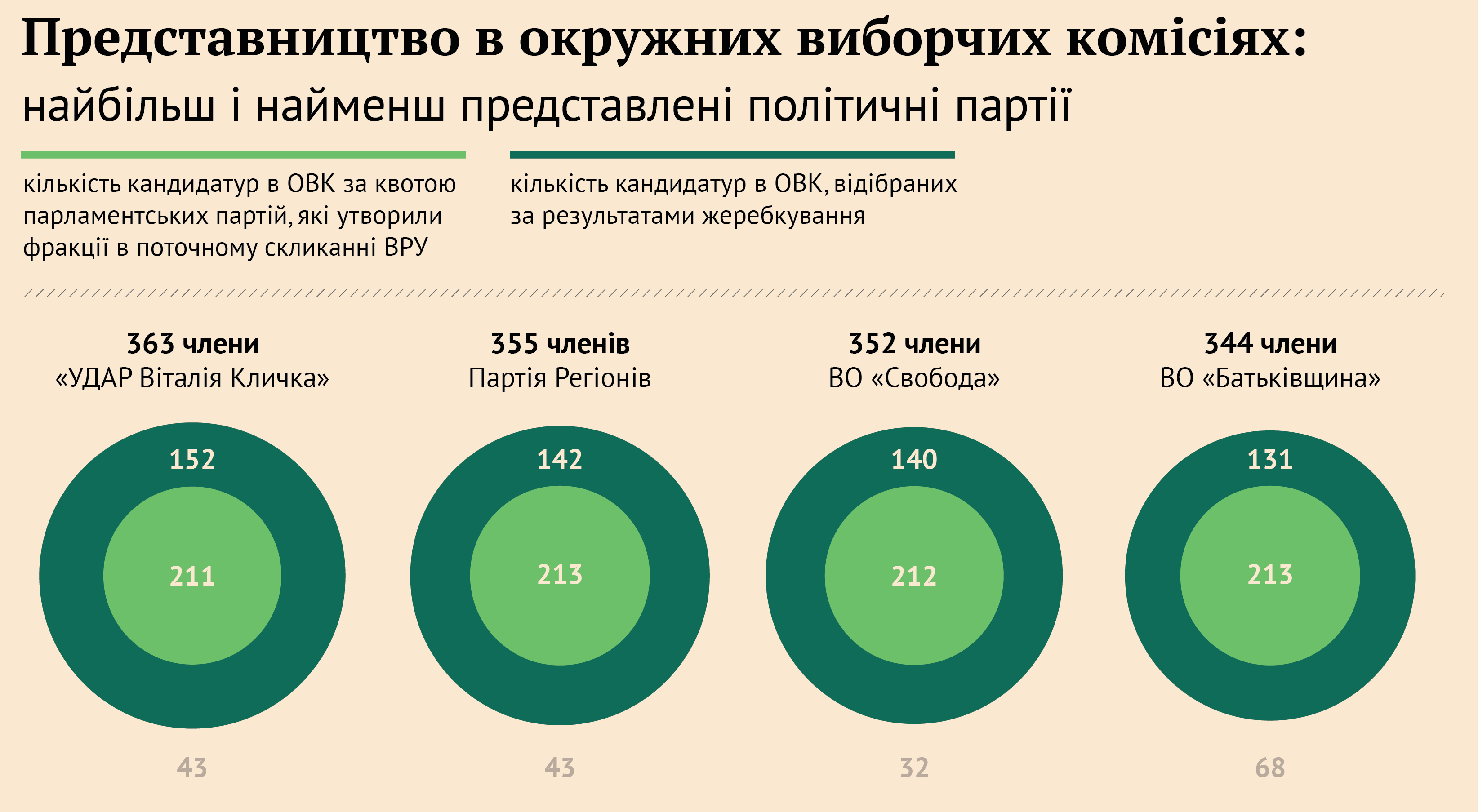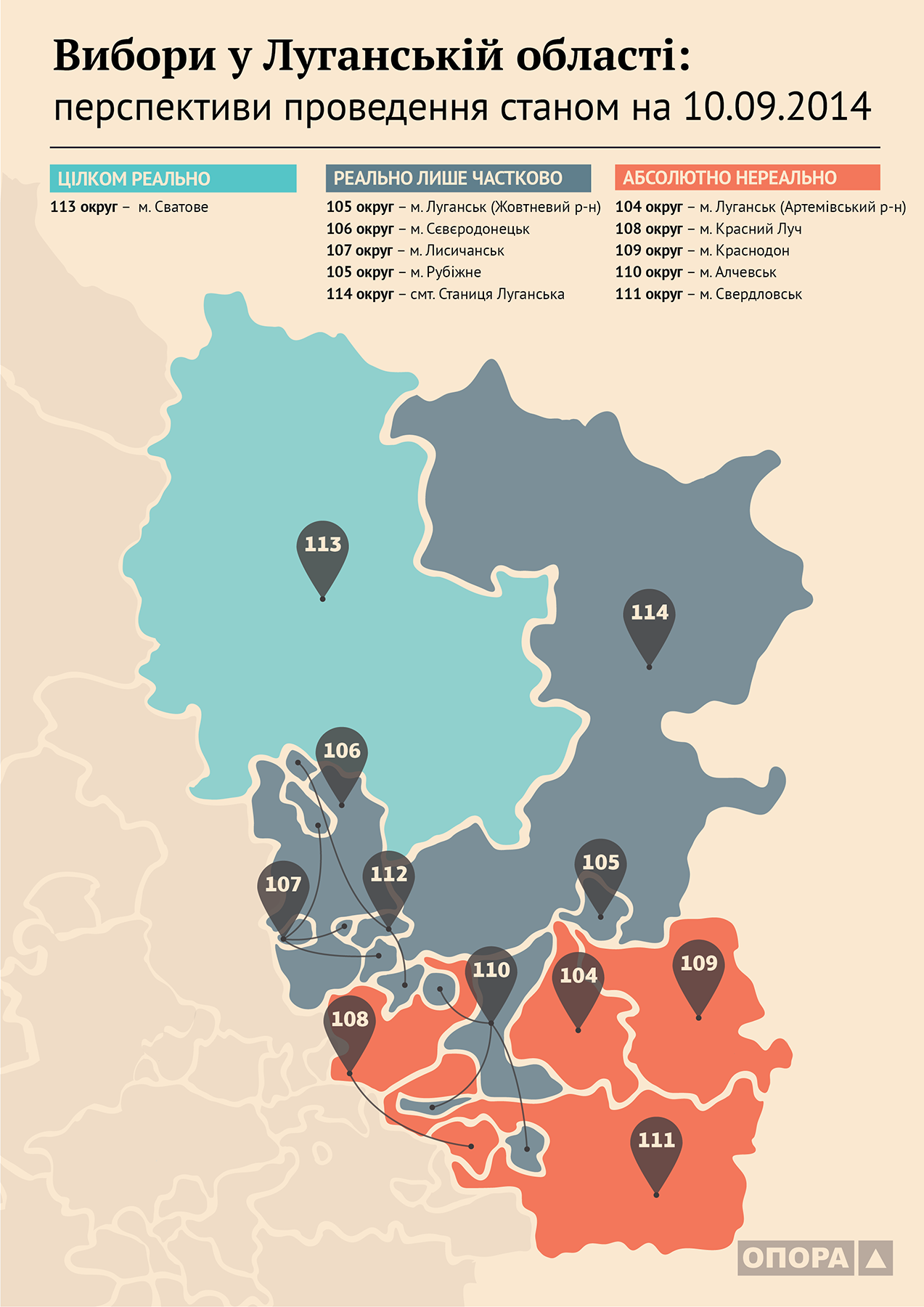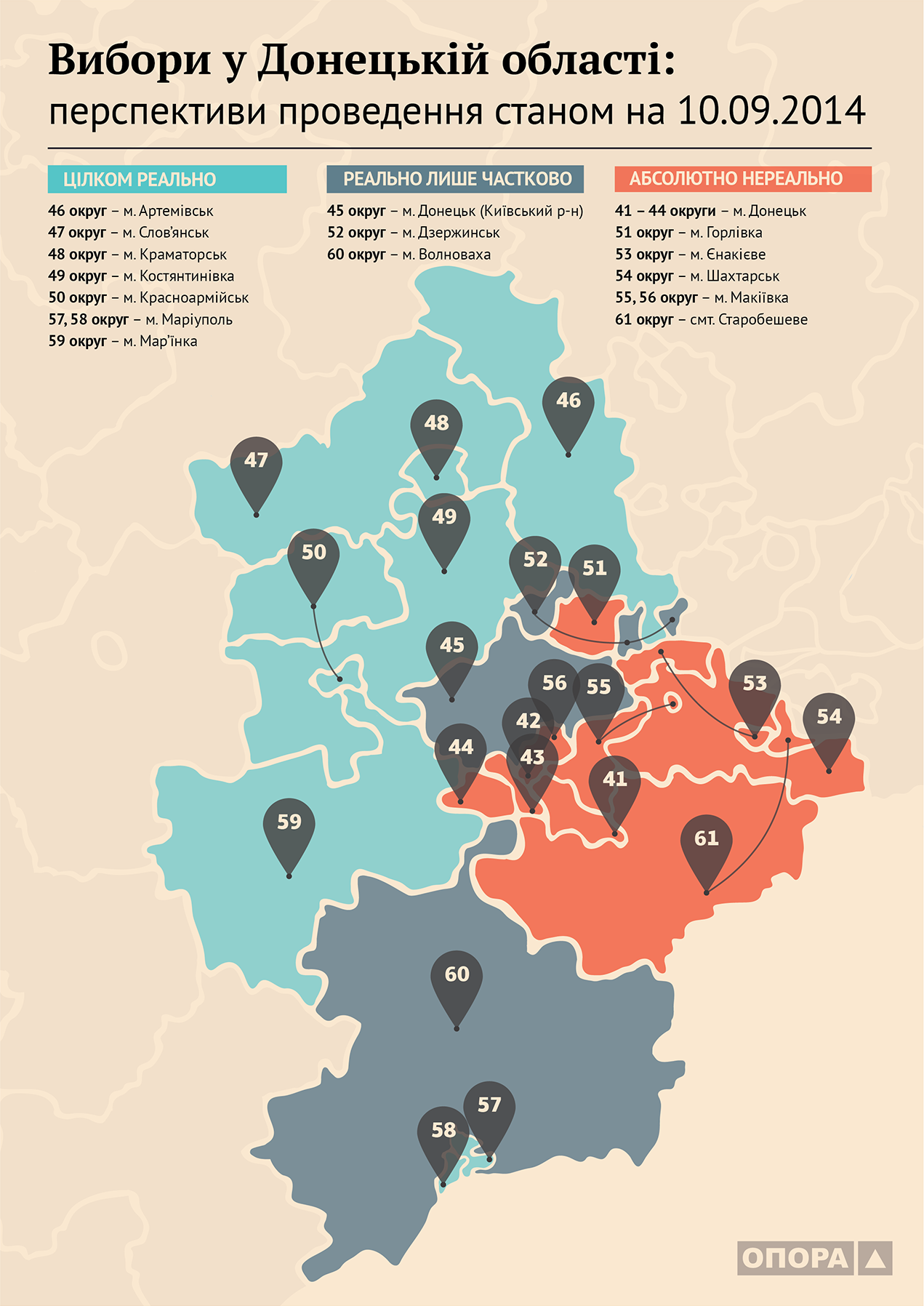The process of preparation and holding special parliamentary elections scheduled for October 26, 2014 has started at the end of August. Elections are held under conditions of social and political tension and blatant Russian aggression in Crimea and Donbass region. At the same time, the Parliamentarians have not made the necessary legislative amendments for optimizing the electoral process in some regions and reducing government spending, and electoral system remained proportional and majority.
The CEC timely created 213 District Election Commissions (DECs) out of representatives of four parliamentary and 21 political parties, candidates of which took part in the previous Parliamentary elections in 2012. However, political influences in the composition of commissions remain opaque.
The Party "UDAR", the Party of Regions, The All-Ukrainian Union "Batkivchshyna" and The All-Ukrainian Union "Svoboda" used the additional right to submit candidates to the DEC as registered parliamentary fractions, which secured them in average more than double advantage in the number of DEC members across the country. Starting from September, civil network OPORA holds a massive observation campaign of special parliamentary elections, during which 213 long-term observers will work in all regions of Ukraine from the official start of campaigning to announcing the final results of elections. On Election Day more than 2000 activists are to join them to conduct rapid statistical vote-counting.
Formation of district election commissions
Formation of DECs for the special elections to the Verkhovna Rada of Ukraine was legitimate and was held in a conflict-free atmosphere. As a result of the drawing carried out by the CEC among 21 political parties and submissions of 4 parliamentary parties (which formed fractions) "UDAR" (363), the Party of Regions of Ukraine (355), The All-Ukrainian Union "Svoboda" (352) and The All-Ukrainian Union "Batkivchshyna" (344) will have the largest number of representatives in the electoral district. “Right sector" (59), the political union "Native Motherland" (90), and the Party of Pensioners of Ukraine (109) have the lowest representation in DECs.
As noted byOl'ha Ajvazovs'ka, Coordinator of electoral and parliamentary programs of “OPORA”: “Political influences in the composition of district commissions remain opaque. Participation of non-influential subjects of electoral process of 2012 model in the formation of DEC creates potential risks of using their quotas in the interests of more powerful political players. According to “OPORA”, political forces which did not surmount the electoral threshold in 2012, occupy 61% of the seats in the newly formed DEC. It should be noted that in the temporarily occupied territories of Crimea and Sevastopol (i.e. districts № 1-10, № 224-225) elections are not organized and not carried out in accordance with Article 8 of the Law "On protection of rights and freedoms of citizens and legal regime for the temporarily occupied territory of Ukraine.”
Most of the DECs had their first meeting on time. In average not less than 70 % of the members of DEC attended the sessions of commissions.
All members who were present at the sessions took the oath. In general, low turnout of commission members became the main problem while organizing first sessions by district election commissions. According to general information collected by observers of civil network “OPORA”, 25% of DEC members (including senior staff) did not participate in the first session of district election commissions.
The most undisciplined members turned out to be the representatives of the political party "Greens" - 69% of DEC members from this party (97 people out of 141) did not show up for the first meeting of the commission. It is followed by the Socialist Party of Ukraine (43% of the members skipped the first meeting), the Radical Party of Oleg Lyashko (41% of absentees) and the Party of Pensioners of Ukraine (40% of absentees).
The main reasons for the lack of members at the first meeting was their refusal to participate in the meeting or their inaccurate contact details (such as incorrect phone numbers)
The state of material and logistical support of election commissions has not reached the satisfactory level so far. There are problems with insufficient space (premises of more than 30 DECs do not meet the CEC requirements), the absence of telephone network, the Internet, office equipment and furniture. This is because at this stage of the electoral process the local authorities have not had time to create the proper conditions for DEC while the latter has not yet received funds allocated for the purchase of necessities.

The electoral process in Donetsk and Lugansk regions
32 single member constituencies (21 in Donetsk region, and 11 in Luhansk region) were created during special elections of the Parliament members of Ukraine in Donetsk and Luhansk districts. Analyst of “OPORA” Alexander Klyuzhev stresses out: “According to “OPORA” as of 10.09.2014 only 9 out of 32 districts of Donetsk and Lugansk regions are ready to hold elections at all polling stations or in all communities."
In Donetsk and Lugansk regions rigorous organization of district election commissions’ work is already complicated at this stage and the commissions do not fully comply with the procedures defined by the law. Two DECs in Donetsk region (№ 49 and 59) were unable to hold the first meeting in three day period allotted by the law. Other commissions in the Donetsk region (including the DECs number 46, 47, 50, 57, 58, 59) worked and took an oath in the absence of quorum.
As “OPORA” estimates as of September 10th in the Donetsk region the probability that elections will be held within the whole territory of the disctrict is true for 8 out of 21 districts, the likelihood of elections to take place in certain part of communities of the district is real for 3 districts, and in 10 other districts there is no possibility of holding elections at the moment. Comparing to the Presidential elections held on 25th of May, then only in 8 out of 21 disctricts voting took place fully or partially.
In Lugansk region (bearing in mind the geographical distribution of districts in connection to specific population density), as of September 10th the probability that elections take place within the whole territory of the district is confirmed for 1 out of 11 districts, while the probability of elections in certain part of communities of the district is real for 5 districts, and in 5 other districts there is no possibility of holding elections at the moment. It should be noted that during the Presidential elections held on 25th of May voting took place fully or partially in 2 out of 12 districts.


Registration of candidates and the start of election campaigning
Special elections of MPs of Ukraine intensified the processes of party reformatting, creation of pre-electoral alliances and changes in the senior composition of political powers. Nomination of candidates for people's deputies of Ukraine has started on August 28th, but as of 10th of September, the CEC has not registered a single electoral list of candidates of political parties. The lack of rush from the side of parties is explained by dynamic time frame of special campaigning and long-term political transformations after the Presidential elections in 2014
In terms of official registration, self-nominated candidates were more active. In single member constituencies there are 69 candidates registered among whom there is only one person nominated by a party (most candidates registered in Odessa region - 14, Donetsk, Zakarpattya, Luhansk regions - 4). According to the Law of Ukraine "On Elections of People's Deputies of Ukraine" a candidate campaigning begins next day after the CEC registered a candidate. Thus, currently only candidates registered in single member constituencies began an official election campaigning.
Despite the lack of official status of the subject of electoral process, de facto political parties have already started campaigning. According to the information collected by “OPORA” observers, campaigning in different regions is not proportional.
Highly active in terms of campaining are Kirovohrad, Kherson, Zaporizhzhya, Odessa and Zhytomyr regions. According to “OPORA”, the vast majority of parties currently engage in outdoor advertising (billboards, city lights, posters, etc.). In such a way political forces inform voters about their intentions to run for the Ukrainian Parliament. In some regions ATL advertising has started (publications, announcements, speeches, stories in the media).
INTERIM REPORT on the basis of a long-term observation of OPORA during special elections of MPs of Ukraine in 2014